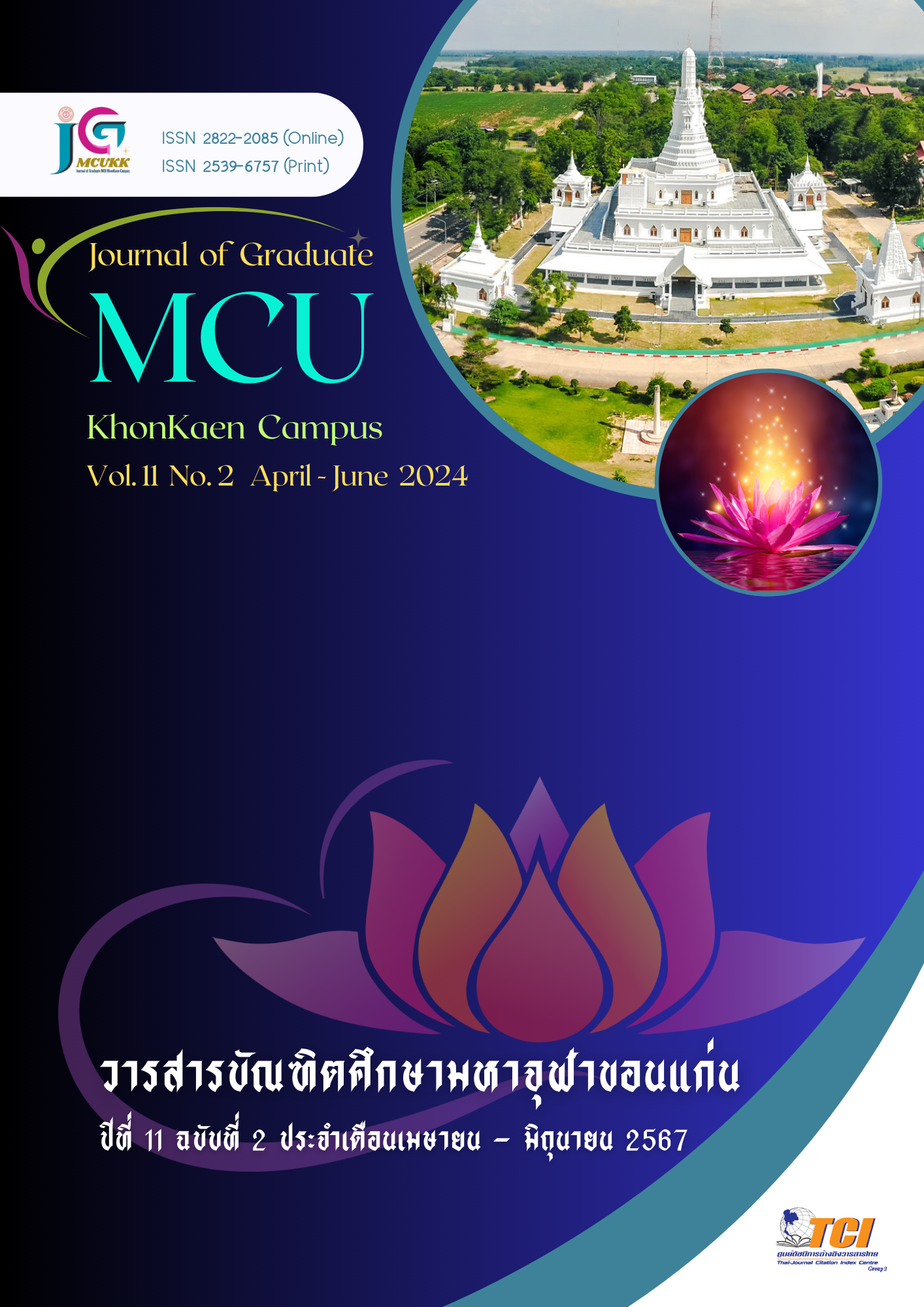การศึกษาผลสัมฤทธิ์ทางการเรียนของนักเรียนที่ได้รับการจัดการเรียนรู้ ด้วยรูปแบบ ICARI Model
Main Article Content
บทคัดย่อ
การวิจัยนี้มีวัตถุประสงค์เพื่อ 1) ศึกษาระดับผลสัมฤทธิ์ทางการเรียนหลังเรียนของนักเรียนที่ได้รับการจัดการเรียนรู้ด้วยรูปแบบ ICARI Model 2) เปรียบเทียบผลสัมฤทธิ์ทางการเรียนเฉลี่ยก่อนและหลังเรียนของนักเรียนที่ได้รับการจัดการเรียนรู้ ด้วยรูปแบบ ICARI Model และ 3) ศึกษาความพึงพอใจของนักเรียนที่มีต่อการจัดการเรียนรู้ด้วยรูปแบบ ICARI Model ประชากรในการวิจัยครั้งนี้เป็นนักเรียนโรงเรียนหนองบัวแดงวิทยาที่กำลังศึกษาในภาคเรียนที่ 2 ปีการศึกษา 2565 ระดับชั้นมัธยมศึกษาปีที่ 1-6 และกลุ่มตัวอย่างที่ใช้ในการวิจัยครั้งนี้คือนักเรียนโรงเรียนหนองบัวแดงวิทยา ระดับชั้นมัธยมศึกษาปีที่ 1-6 จำนวน 8 ห้องเรียน ที่ได้มาโดยการสุ่มแบบกลุ่ม ใช้ห้องเรียนเป็นหน่วยการสุ่มดำเนินการจัดการเรียนรู้โดยใช้แผนการจัดการเรียนรู้รูปแบบ ICARI Model เก็บรวบรวมข้อมูลโดยใช้แบบทดสอบวัดผลสัมฤทธิ์ทางการเรียนก่อนและหลังเรียน เและแบบสอบถามความพึงพอใจของนักเรียนต่อการจัดการเรียนรู้ด้วยรูปแบบ ICARI Model วิเคราะห์ข้อมูลโดยใช้สถิติพื้นฐาน และค่าสถิติ t-test for dependent sample
ผลการวิจัย พบว่า
นักเรียนที่ได้รับการจัดการเรียนรู้ด้วยรูปแบบ ICARI Model มีระดับผลสัมฤทธิ์ทางการเรียนหลังเรียนอยู่ในระดับปานกลางถึงระดับสูง มีผลสัมฤทธิ์ทางการเรียนเฉลี่ยหลังเรียนสูงกว่าก่อนเรียน อย่างมีนัยสำคัญทางสถิติที่ระดับ .05 และนักเรียนที่ได้รับการจัดการเรียนรู้ด้วยรูปแบบ ICARI Model มีความพึงพอใจต่อการจัดการเรียนรู้ในระดับมาก (= 3.87, S.D. = 0.82) จากข้อค้นพบจากการวิจัย ผู้วิจัยมีข้อเสนอแนะในการส่งเสริมให้มีการจัดการเรียนรู้ด้วยรูปแบบ ICARI Model เพื่อพัฒนาศักยภาพการเรียนรู้และผลสัมฤทธิ์ทางการเรียนของผู้เรียน
Article Details

อนุญาตภายใต้เงื่อนไข Creative Commons Attribution-NonCommercial-NoDerivatives 4.0 International License.
เอกสารอ้างอิง
จุราภรณ์ ปฐมวงษ์. (2565). การพัฒนารูปแบบการเรียนรู้เชิงรุก (Active Learning) เพื่อส่งเสริมทักษะการพูดสนทนาภาษาอังกฤษ สำหรับนักเรียนชั้นมัธยมศึกษาปีที่ 3. Journal of Modern Learning Development, 7(4), 143-159.
ทินพันธ์ บุญธรรม. (2556). การบริหารงานวิชาการกับประสิทธิภาพการสอนของครูคณิตศาสตร์ในโรงเรียนที่ขาดแคลนครูคณิตศาสตร์ สังกัดสำนักงานเขตพื้นที่ การศึกษามัธยมศึกษา เขต 9. (วิทยานิพนธ์ศึกษาศาสตรมหาบัณฑิต). กรุงเทพฯ: มหาวิทยาลัยศิลปากร.
วนัขพร ชมชื่นใจ, สมวงษ์ แปลงประสพโชค และ กฤษณะ โสขุมา. (2565). ผลสัมฤทธิ์ทางการเรียนเชิงรุก (Active Learning) เรื่อง อัตราส่วน สัดส่วน และร้อยละ สำหรับนักเรียนชั้นมัธยมศึกษาปีที่ 1. วารสารวิจัยรำไพพรรณ, 16(2), 102-108.
ศักรินทร์ ยอดมณีย์, กิตติมา พันธ์พฤกษา และ เมธี ธรรมวัฒนา. (2565). ผลสัมฤทธิ์ทางการเรียนเชิงรุกร่วมกับการเรียนรู้แบบโครงงานที่มีต่อผลสัมฤทธิ์ทางการเรียนและความสามารถในการแก้ปัญหา เรื่อง การออกแบบและเทคโนโลยี สำหรับนักเรียนชั้นมัธยมศึกษาปีที่ 2. วารสารครุศาสตร์ปริทรรศน์ฯ, 9(2), 174-185.
สำนักงานคณะกรรมการการศึกษาแห่งชาติ. (2545). สํานักนโยบายแผนและมาตรฐานการศึกษา ศาสนา และวัฒนธรรม แผนการศึกษาแห่งชาติ (พ.ศ.2545-2559) : ฉบับสรุป. (พิมพ์ครั้งที่ 2). กรุงเทพฯ: พริกหวานกราฟฟิค จำกัด.
สำนักวิชาการและมาตรฐานการศึกษา. (2560). แนวทางการจัดการเรียนรู้ตามหลักสูตรแกนกลางการศึกษาขั้นพื้นฐาน พุทธศักราช 2551. กรุงเทพฯ: ชุมนุมสหกรณ์การเกษตรแห่งประเทศไทย.
สุปรียา แก้วเจริญ และ อุบลรัตน์ ศิริสุขโภคา. (2561). การพัฒนาผลสัมฤทธิ์ทางการเรียนด้วยบทเรียนคอมพิวเตอร์ช่วยสอนประเภทเกม โดยใช้วิธีการสอนแบบ Active Learning เรื่อง ซอฟต์แวร์น่ารู้ สําหรับนักเรียนชั้นมัธยมศึกษาปีที่ 2. งานประชุมวิชาการระดับชาติครั้งที่ 10 มหาวิทยาลัยราชภัฏนครปฐม. นครปฐม: มหาวิทยาลัยราชภัฏนครปฐม.
อรรถพงษ์ ผิวเหลือง. (2564). รูปแบบการจัดการเรียนรู้ที่เน้นการเรียนรู้โดยการกระทำ. วารสารบัณฑิตศึกษามหาจุฬาขอนแก่น, 8(4), 22-30.

